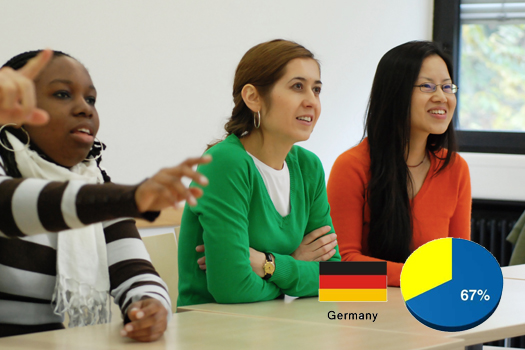The German language has become popular not only in Europe but also to other parts of the world because of its cultural essence and its versatility. With German universities taking ground in Germany, a person needs a proficiency in the German language to be able to pursue education from one of the top universities. While you have learned the basics of the language from the Best German Language Institute in Delhi, and have gone through the skills to flaunt those compound nouns, it’s time that you take a step forward and see what else German has in store for you. One of the major challenges that the German language creates its learners to overcome is that of adjective endings.
What makes the German adjective endings so complicated?
It is a true adage that the devil lies in the details. Here are four factors that make the adjective change their endings every now and then:
- The gender of the nouns: masculine, feminine and neuter
- The singularity or plurality of the nouns
- Whether the article is definite or indefinite
- The case: nominative, accusative, genitive or dative
In English, none of these factors are required to change the adjective endings. For example, the word ‘beautiful’ remains as it is. See: a beautiful woman, the most beautiful house, a beautiful movie, beautiful flowers; the singularity or the gender does not affect the adjective beautiful in any way. We know it’s daunting but achievable. Before you look at the below tips, go through some German adjective endings examples that will make you understand the difference and help you grasp them as well.
Determine the form of an article
In order to determine the right form of an article, you need to take two factors into consideration:
- The gender of the noun
- The case of the noun
While you memorize the gender of a noun with a dictionary by your side, look for these four cases:
- The nominative case generally is the subject of a sentence
- The accusative case of the object
- The dative case if the indirect object
- The genitive case adds the word ‘of’ in a sentence
When you go through the German adjectives list, keep the below table handy to learn the correct application of these adjective endings:
| Masculine
Gender |
Feminine
Gender |
Neuter
Gender |
Plural noun | |
| Nominative
Case |
Der | Die | Das | Die |
| Accusative
Case |
Den | Die | Das | Die |
| Dative
Case |
Dem | Der | Dem | Den |
| Genitive
Case |
Des | Der | Des | Der |
Find the accurate adjective ending
Adjective endings can be categorized as strong and weak depending upon the usage of the article. Use strong ending after the indefinite article, and a weak ending after the definite article.
Look for these three cases to apply a strong ending to your adjective:
- Indefinite articles
- kein/keinen/keine
- possessives
Here we have a strong ending table to help you learn faster:
| Masculine | Feminine | Neuter | |
| Nominative | -er | -e | -es |
| Accusative | -en | -e | -es |
| Dative | -en | -en | -en |
| Genitive | -en | -en | -en |
Also, have a look at the weak ending table:
| Masculine | Feminine | Neuter | |
| Nominative | -e | -e | -e |
| Accusative | -en | -e | -e |
| Dative | -en | -en | -en |
| Genitive | -en | -en | -en |
Once you take a good look at these tables and memorize and understand them by heart, you will find it easier to play with German adjectives and make use of the real time.
Conclusion
You can look for a German adjectives list to help you understand the rules of German grammar better. German adjectives can be hard to play with, but once you get a hold of it, no one can stop you to master the language and attain a high level of proficiency. For more insight, take up a German language course in cp and get a good grip of the language.




